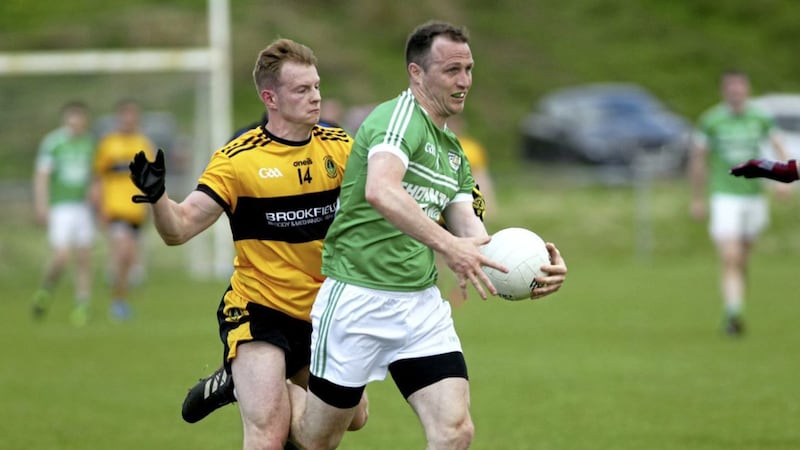LENNY Harbinson wasn’t long in the Antrim job when he set about trying to tempt Michael McCann back into the fold.
He’d retired the year previous but, having played some of the best football of his career over the past few seasons with Cargin, there was still a flame flickering.
McCann let his guard down and told the new manager to send on their schedule for the next couple of months.
And that was the end of that.
“He sent me it through and there wasn’t even a question. I just said no chance, couldn’t do it. They were training three nights a week in Belfast between Monday and Friday, and then Saturday and Sunday every weekend.
“That was from October, November time. And then you had the National League fixtures and four of the seven were away weekends between February and April. So out of seven or eight weekends, I’d have been away all weekend for four of them.
“I have three children, one of them was just over five months old at that stage, and I just couldn’t do that. Mentally I just couldn’t stick it.”
He’s speaking last Tuesday, just hours after the release of the ESRI study into the demands being placed on inter-county footballers and hurlers, of which he was one for a decade.
It detailed the physical and mental impact on just over 1,000 players that plied their trade at senior county level in 2016, based on their answers in both a survey and at workshops.
Among some startling findings was the fact that the average player was dedicating 31 hours per week to the game, while the players’ average score in a test on their mental wellbeing was found to be notably lower than the average population of Ireland within a similar age bracket.
Players were being forced to give up time with their family and friends, time at other hobbies, and the study also found that they weren’t getting the requisite level of sleep.
McCann says that hearing of such findings reminded him exactly of how he felt towards the end of his inter-county career.
“Once you have different priorities like children, it just gets too much. I was getting halfway through seasons and thinking ‘this is too much, I need away from this’, but sticking it out until the end of the year.
“That’s all I was doing was seeing it out. I remember having a few conversations with ‘Baker’ [Liam Bradley] at a time, halfway through the season and finished the league, and saying to him ‘I need away from this’.
“And he sort of gave me time off. I went back to save face more than anything, just so as not to be leaving in the middle of it.
“It’s usually a big thing if somebody leaves prior to championship, it gets out and it’s fairly well voiced, and I thought I couldn’t be bothered with that sort of attention. So you end up seeing it out for the sake of seeing it out.
“That’s what finished me in the end, those drives to Belfast to train four nights a week in midweek, never mind your weekends away.”
McCann, who stood out a mile at midfield for Cargin against Lámh Dhearg last weekend, believes that players will not say no to any increase in demands, and that their only way to scale back is to leave.
“If you take an average person should sleep eight to ten hours a night, that leaves you maybe 14 or 15 hours a day. If somebody works nine of those, that leaves you six.
“You have 30 hours of your own time midweek, and if I’m going to Belfast it’s at least four hours. I’d be leaving work at 6 to drive to Belfast and I wouldn’t be home until 10 o’clock.
“That’s four hours out of the six that I have to myself. You take that across three nights, out of your 30 hours you’re spending 12 to 15 of them training. And that’s not taking in weekends and all that.
“It’s just absolute madness. Injury rates are all going up. Players just say yes, yes, yes. They just go with it because they’re being told ‘Dublin are doing this’ or somebody else is doing that, and you don’t even ask.
“You just think you’re not going to be the man to say ‘no, I’m not doing that’. And if you are, you walk away from it. That’s the only way to say no.”
He hasn’t played for Antrim since the summer of 2016, but even in recent years with Cargin he’s noticed the club game heading down the same path.
And that, he feels, has been a large contributor to falling numbers. Where once Cargin, who won back-to-back Antrim SFC titles in 2015 and 2016, could have fielded three separate teams on one night, McCann says their training numbers are now down to 20 during the inter-county season, and that their reserves no longer train.
“We had five or six players at Antrim for close to ten years there, and you take those five or six out of a group of 25 senior players…
“The only reserve players that train are the ones that are pushing into the seniors. We have no reserve training. If you take a panel of 25, take six men out of it and a couple of injuries or men missing, you’re down to 20 every session.
“We had a couple of county men this year and we never saw them. I don’t blame them. They were training five and six days a week. You couldn’t expect them to come out and train another day with the club.
“So there's kind of a split already there.”








